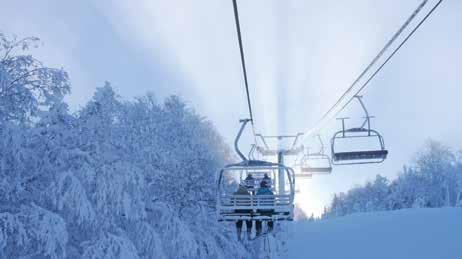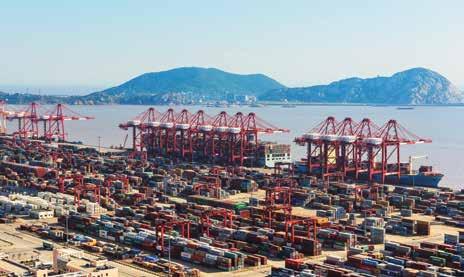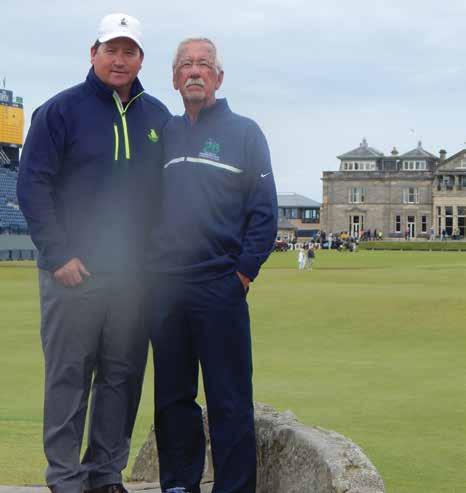
8 minute read
My Story
NOT READY TO RETIRE
Growing up on a small farm in the country, my life plan was to get an education and see the world. It worked out well—just not how I thought it would.
Advertisement
BY TOM PETERS
When I called it quits after 41 years of working for the same company, I wasn’t throwing myself into a black hole of the unknown. I never thought of calling it “full retirement” because that wasn’t in my plan. My years as reporter, editor and bureau chief at The Chronicle Herald afforded me a world of experiences and a wealth of contacts, all useful in the years to come.
I started in the newspaper business more out of desperation than by design. I had my sights set on university after high school, but with an unfavorable climate at home I decided to leave the farm. I spent the summer with a friend in Halifax, picking up odd jobs. Money was scarce so I put my education on hold. It wouldn’t be until later, in married life, that I got to go to university, taking summer courses and attending night school.
But it was September, 1968, and I was getting desperate for full-time work. A friend suggested I apply to “The Herald and Mail,” as the paper often hired in the fall when summer staff went back to school. As luck would have it, I landed a job as the office boy or “gofer” in the newsroom. The learning curve was steep and I soaked it all in. After six months an opening came in the sports department. Having been a jock all my life, I applied and became a reporter in training. One of my early assignments was a one-on-one interview with the amazing Jean Beliveau of the Montreal Canadiens.
I was soon on the front lines, assigned to cover sporting events at all levels. Not only did I get a front row seat to many great competitions, but I also got to travel, which instilled a lifelong desire to see as many places as I could. My father, a Navy man who saw a good part of the world, always said travel was the best education.
As my career progressed, I covered news, politics and business, managed a bureau in the ‘burbs, and eventually became an assignment editor and a news editor.
I took up golf at a young age, hitting balls in the pasture on the family farm; later I joined a golf club. I covered golf as a sports reporter so I got to see many great golf courses and do a little freelance work on the side. I would combine my love of travel with golf and then write about my trips, first for the paper’s travel section and later on for other publications.
Eventually, I was getting enough vacation that I would use some to travel to different countries to play golf and write about my travel experiences. My friends called it a dream job. China, Malaysia, Thailand, South Africa, many U.S. states, the Caribbean, most provinces in Canada, and many other places have all been part of my golf itinerary.
In the winter, my family was involved in alpine skiing, our children as racers and my wife and I as skiers who were involved with the race club. On the weekends we would travel around the Maritimes to watch the kids race. During spring break
His kind of place: The snowy hills of Québec.

we would take a ski vacation to either New England or Québec. Like traveling and writing about golf courses, I began doing the same with skiing. I’ve cruised down trails in the Canadian Rockies, the U.S. and even Switzerland.
I met my wife Sally (Sara), who grew up in Halifax, in 1969. We jokingly say we had a shipboard romance. One night we were at separate parties onboard a merchant marine vessel in Halifax. I had stepped off the ship for a short period and when I returned I went into the wrong cabin and the wrong party. Sally and I started to chat and the rest, as they say, is history. In October of this year we will mark the 50 th anniversary of our wedding.
My wife, who has a sharp math and science mind, had a career as an x-ray technologist. Her math brain served our two children well in both high school and university. She had never really played sports, so when we got into skiing in our early thirties it was a whole new adventure for her. Since her retirement, she has taken up and thoroughly enjoys golf as a member of a metro ladies golf group and with me at the club. Our four grandchildren, two in Dartmouth and two in Ontario, are a big part of our lives. In my last 10 years or so at the paper I was a business reporter with a focus on the local transportation industry, writing about events and developments at the Halifax Stanfield International Airport, the Port of Halifax, the railway, and the trucking industry.
The aviation and marine industries were of particular interest to me. Before the security clampdown after 9/11, I roamed, with an escort, through the back halls of the airport terminal building and even into the air traffic control tower. I remember late one night being at the airport to see a sleek, French Concord, with its iconic gulf-like wings, land in Halifax.

The plane was carrying French President Francois Mitterrand and his entourage. The Concorde landed in Halifax to refuel so it could continue to its destination in the U.S. where Mitterrand was to attend an
Yangshan Deep Water Port, located in Shanghai, is the largest cargo port in the world.

international conference. I walked under the plane with a Concord representative and later, around 1 a.m., was in the control tower to watch it blast into the night sky.
The piers and the wharves at the port were equally accessible prior to 9/11. You could wander through the old cargo sheds and along the wharves without interference from anyone. I learned a lot about the shipping industry and its operations. I would go with the harbour pilots when the pilot vessel took them out to the container vessels or cruise ships, climb a rope ladder up the side of the vessel and then take control of the ship, whether it was a massive container ship or a cruise ship, and bring it into port.
I travelled to China and other Asian countries reporting on business meetings between Halifax Port Authority officials and marine industry executives in that part of the world. The message was to sell Halifax as a cargo gateway to Central Canada and the U.S. Midwest. My first impression of China was the Chinese didn’t do anything small.
The Chinese government wanted another major deep water port for the vast amounts of cargo moving in and out of the country. They took Yangshan Island, about 33 kilometres off the coast in the South China Sea, and basically flattened the island and built a massive container port. They also built a 33 km bridge to connect the island to the mainland. I was told it took six years to plan the project and two and a half years to build it. The cost was never revealed but one report suggested close to $20 billion.
I got to meet many interesting people, including former Prime Minister Joe Clark. He wasn’t prime minister at the time. I got a call from one of his aides asking if I would meet with Mr. Clark on a wharf at the port. When I arrived he was alone, standing at the end of the pier watching a large cargo vessel from Saudi Arabia moving away from the dock. I spent the next 20 minutes or so alone with Mr. Clark answering his questions about the Port of Halifax and the marine industry.
During my years covering the port I began to do some freelance work for a marine industry publication in Central Canada and one in the U.S. It was the beginning of another career. My training and background in the newspaper business set me up nicely to do the things I do today.
I “retired” or left the paper at age 60 and for the past 10 years I’ve continued to enjoy the golf and marine world. I set up a small office in a spare bedroom and expanded my freelance work. In the past decade I’ve traveled to the British
Birthplace of golf: Tom Peters (right) in Scotland with his son.

Open in Scotland with my son, and have been to India, the United States, the Caribbean and Canada to play golf and to write about my adventures.
India was fascinating, but go with an open mind. Like China, there are people everywhere. And contrasts: garbage and gardens, good smells and bad smells, poverty and wealth, massive traffic congestion in the cities and sacred cows on the roads. And there are religious and cultural

traditions like the outdoor cremation I happened upon in Shillong. An elderly lady of the Hindu faith had passed away and was being cremated in a massive outdoor fire. Her family stood around and observed the whole process. Her son explained to me that her ashes would be collected and spread over one of India’s seven sacred rivers.
I also dabble in the cruise industry. Cruising has become a passion for my wife and me over the past several years. We play golf throughout the summer.
Also in summer, my wife and I and our two children and their families rent cottages in the same location on the North Shore of Nova Scotia. Our son makes the annual trek from Ontario with his wife and two boys. Our daughter, her husband and their two girls live here, and we get to see them on a regular basis.
So I have decided with my work and play, real retirement isn’t an option. I just don’t have time!
Tom Peters is a freelance writer living in Lower Sackville, NS. Retired from the newspaper business, he enjoys writing about his passions—golf, travel and the marine industry. Email: tom26449@ gmail.com










